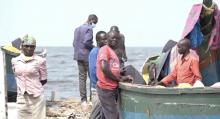Kasensero Presents yet Another Challenge to Uganda’s Public Health
Ms Sophia Tageya, a midwife at Masaka Regional Referral Hospital, is currently the team-lead of the COVID-19 response team at Kasensero landing site, located on the shores of Lake Victoria in Kyotera district, Southern Uganda.
The landing site is arched in the annals of public health history as the epitome of the HIV/AIDS pandemic in Uganda.
Proud to lead the 10 man team, Sophia says she has never been prouder to be a health worker than she is now, during the COVID-19 response.
“When I heard of the outbreak, I immediately wanted to be part of the response and render my services to my fellow Ugandans,” she says as she recounts her daily routine.
Kansesero landing site receives fishermen who ply the Lake Victoria waters for fresh-water fish and go as far as the Tanzanian side of the lake shores. On average, over 30 fishermen are tested daily for COVID-19 at Kasensero.
“We have been equipped by the Ministry of Health to implement measures against COVID-19 in this area. When we started, we had challenges implementing some measures such as physical distancing and wearing of masks by the general public.”
Indeed, while there has been a noticeable adherence to some of the measures, there is visible laxity among the locals, especially regarding physical distancing, hand-washing and the correct and consistent wearing of masks in public.
“These masks are not comfortable, we are still getting used to wearing them,” says Mzei Wasswa, a resident of Kasensero. Further interaction with the residents indicates low COVID-19 risk perception in this community.
As Sophia Tageya notes, there is a big challenge getting the community to understand the risk of COVID-19. However, she and her colleagues continue to sensitize the people hoping that eventually the messages will sink in and lead to there desired prevention and control behaviours.
“We have received a lot of support from the Ministry and the World Health Organization (WHO), who have reinforced the message to the locals because they are more respected,” she observes.
Mr Benjamin Sensasi, the WHO Health Promotion Advisor, currently supporting the greater Masaka Region on risk communication and community engagement, where Kansesero is located, concurs with Sophia.
He, however, notes that there has been a noticeable behavioural change among the community members, although “it’s been a painfully slow process.”
Kasensero is just one of the many areas receiving COVID-19 prevention support from the Ministry of Health and WHO.
In addition to community engagement and risk communication, support in case management, surveillance, laboratory testing, sample transportation and psychosocial counselling is being availed.
Dr Andrew Nsawotebba, a laboratory specialist heading the Mutukula Port Health Laboratory notes that the establishment of the Port Health Laboratory has been instrumental in managing the COVID-19 response in Uganda.
“Here, we can test 760 samples of truck drivers per day using the GeneXpert machine,” he says while conducting a tour around the facility. “Apart from Mutukula, we receive samples from other Points of Entry including Bunagana, Cyanika, Mirama Hills and Kansesero,” he notes.
The samples from the above points of entry are transported to the Port Health Laboratory using a fleet of WHO-deployed vehicles.
Notably, the dedication of all health workers including Sophia Tageya and Andrew Nsawotebba has helped Uganda control the spread of COVID-19 infections – at least for now.
The COVID-19 response in Uganda is just evolving. It is, however, worth noting that partnership and cordial working relationship between the government of Uganda and WHO is paying effectiveness response dividends.
Health Promotion Advisor
Tel. : +256 414 335505
Cell: +256 772 507906
Email: sensasib [at] who.int (sensasib[at]who[dot]int)
Public Information Officer
Tel. : +256 313 335569
Cell: +256 786 497073
Email: mwebembezie [at] who.int (mwebembezie[at]who[dot]int)



